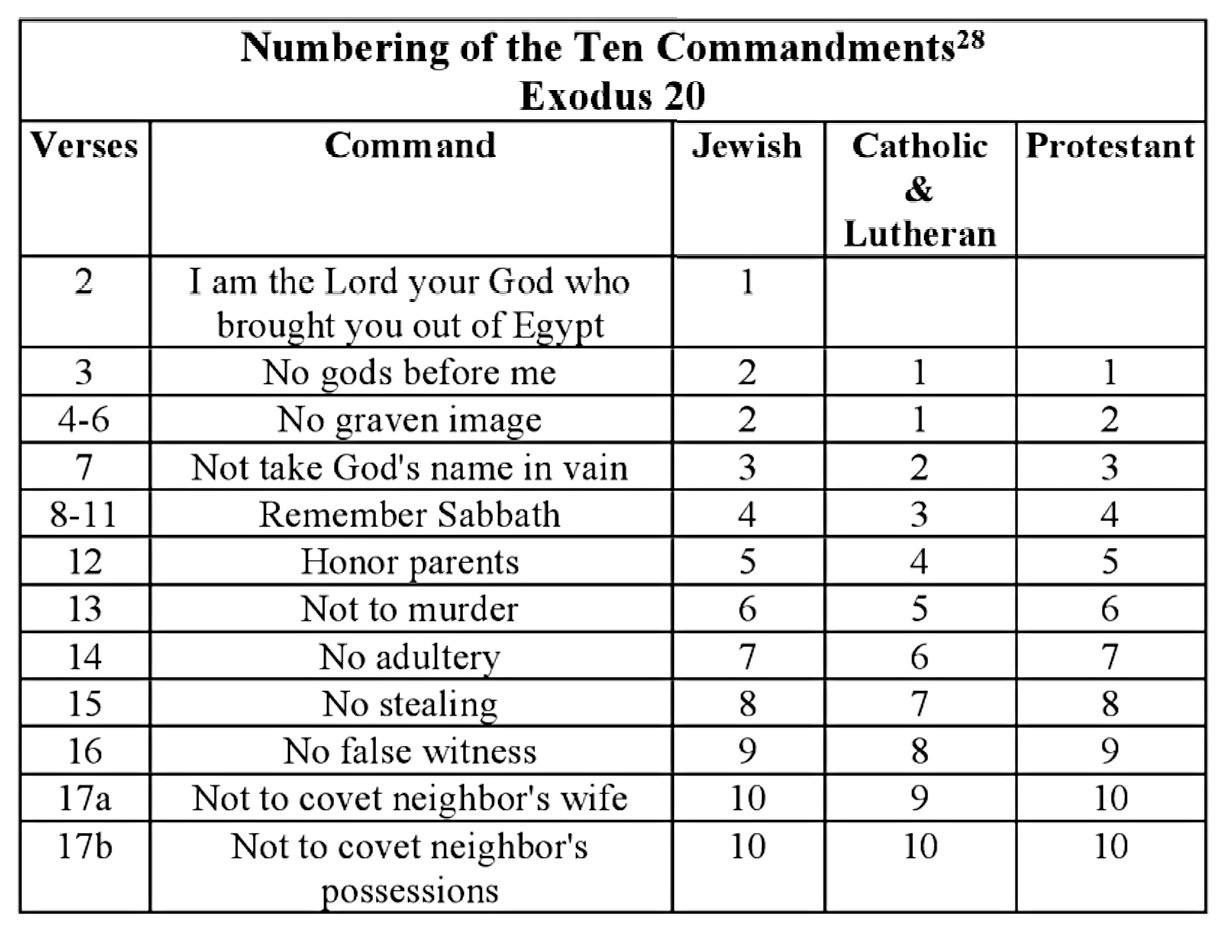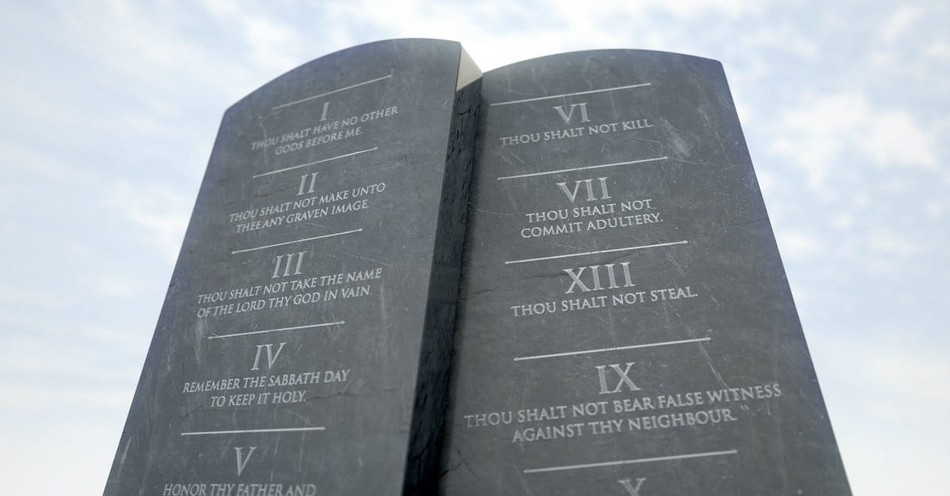Here are lists of the 10 Commandments in short form and as found in Exodus 20 and Deuteronomy 5. We have also included lists of the Ten Commandments with Catholic and Jewish numbering for reference.
God wrote the Ten Commandments on stone tablets and gave them Moses to share with all the Israelites soon after they left captivity in Egypt (Exodus 20:1-26). Moses reiterated them 40 years later in Deuteronomy 5:1-22 as the Israelites neared the Promised Land.
Even thousands of years after Moses was given these laws directly from God, they still influence and guide the moral principles of Christianity today. Further, discover Jesus's teaching and fulfillment of the commandments.
Table of Contents
- 10 Commandments: Short Form
- 10 Commandments in Exodus 20
- 10 Commandments in Deuteronomy 5
- Catholic Numbering
- Jewish Numbering
- Importance Today
- Why Two Tablets?
- What Did Jesus Say?

Descent from Mount Sinai by Cosimo Rosselli in the Sistine Chapel
Short List of the 10 Commandments
1. Thou shalt not have any other gods before God.
2. Thou shalt not make yourself an idol.
3. Thou shalt not take the Lord's name in vain.
4. Remember the Sabbath Day and keep it Holy.
5. Honor your Father and Mother.
6. Thou shalt not murder.
7. Thou shalt not commit adultery.
8. Thou shalt not steal.
9. Thou shalt not testify or bear false witness against your neighbor.
10. Thou shalt not covet.
The 10 Commandments in Exodus 20
1. “I am the LORD your God, who brought you out of the land of Egypt, out of the house of bondage. You shall have no other gods before Me." (Exodus 20:2-3)
2. “You shall not make for yourself a carved image—any likeness of anything that is in heaven above, or that is in the earth beneath, or that is in the water under the earth; you shall not bow down to them nor serve them. For I, the LORD your God, am a jealous God, visiting the iniquity of the fathers upon the children to the third and fourth generations of those who hate Me, but showing mercy to thousands, to those who love Me and keep My commandments." (Exodus 20:4-6)
3. “You shall not take the name of the LORD your God in vain, for the LORD will not hold him guiltless who takes His name in vain." (Exodus 20:7)
4. “Remember the Sabbath day, to keep it holy. Six days you shall labor and do all your work, but the seventh day is the Sabbath of the LORD your God. In it you shall do no work: you, nor your son, nor your daughter, nor your male servant, nor your female servant, nor your cattle, nor your stranger who is within your gates. For in six days the LORD made the heavens and the earth, the sea, and all that is in them, and rested the seventh day. Therefore the LORD blessed the Sabbath day and hallowed it." (Exodus 20:8-11)
5. “Honor your father and your mother, that your days may be long upon the land which the LORD your God is giving you." (Exodus 20:12)
6. “You shall not murder." (Exodus 20:13)
7. “You shall not commit adultery." (Exodus 20:14)
8. “You shall not steal." (Exodus 20:15)
9. “You shall not bear false witness against your neighbor." (Exodus 20:16
10. “You shall not covet your neighbor’s house; you shall not covet your neighbor’s wife, nor his male servant, nor his female servant, nor his ox, nor his donkey, nor anything that is your neighbor’s.” (Exodus 20:17)
The 10 Commandments in Deuteronomy 5
Moses recounted the 10 Commandments after 40 years of wandering in the wilderness. There are only a few differences in the language from Exodus 20. These minor distinctions are found in the 4th, 5th, and 10th Commandments.
1. “I am the LORD your God who brought you out of the land of Egypt, out of the house of bondage. You shall have no other gods before Me." (Deut. 5:6-7)
2. “You shall not make for yourself a carved image—any likeness of anything that is in heaven above, or that is in the earth beneath, or that is in the water under the earth; you shall not bow down to them nor serve them. For I, the LORD your God, am a jealous God, visiting the iniquity of the fathers upon the children to the third and fourth generations of those who hate Me, but showing mercy to thousands, to those who love Me and keep My commandments." (Deut. 5:8-10)
3. “You shall not take the name of the LORD your God in vain, for the LORD will not hold him guiltless who takes His name in vain." (Deut. 5:11)
4. “Observe the Sabbath day, to keep it holy, as the LORD your God commanded you. Six days you shall labor and do all your work, but the seventh day is the Sabbath of the LORD your God. In it you shall do no work: you, nor your son, nor your daughter, nor your male servant, nor your female servant, nor your ox, nor your donkey, nor any of your cattle, nor your stranger who is within your gates, that your male servant and your female servant may rest as well as you. And remember that you were a slave in the land of Egypt, and the LORD your God brought you out from there by a mighty hand and by an outstretched arm; therefore the LORD your God commanded you to keep the Sabbath day." (Deut. 5:12-15)
5. “Honor your father and your mother, as the LORD your God has commanded you, that your days may be long, and that it may be well with you in the land which the LORD your God is giving you." (Deut. 5:16)
6. “You shall not murder." (Deut. 5:17)
7. “You shall not commit adultery." (Deut. 5:18)
8. “You shall not steal." (Deut. 5:19)
9. “You shall not bear false witness against your neighbor." (Deut. 5:20)
10. “You shall not covet your neighbor’s wife; and you shall not desire your neighbor’s house, his field, his male servant, his female servant, his ox, his donkey, or anything that is your neighbor’s." (Deut. 5:21)
The 10 Commandments: Catholic Numbering
1. “I am the LORD your God: you shall not have strange Gods before me.
2. “You shall not take the name of the LORD your God in vain.
3. “Remember to keep holy the LORD’s Day.
4. “Honor your father and mother.
5. “You shall not kill.
6. “You shall not commit adultery.
7. “You shall not steal.
8. “You shall not bear false witness against your neighbor.
9. “You shall not covet your neighbor’s wife.
10. “You shall not covet your neighbor’s goods.”
(Source: “Catechism of the Catholic Church”)
The 10 Commandments: Jewish Numbering
1. “I am the Lord your God who brought you out of the land of Egypt, the house of bondage.
2. “You shall not recognize the gods of others in My presence. You shall not make yourself a carved image nor any likeness of that which is in the heavens above or on the earth below or in the water beneath the earth. You shall not prostrate yourself to them nor worship them, for I am the Lord, your God.
3. “You shall not take the Name of the Lord, your God, in vain, for The Lord will not absolve anyone who takes His Name in vain.
4. “Remember the Sabbath day to sanctify it. Six days shall you work and accomplish all your work; but the seventh day is Sabbath to the Lord, your God; you shall not do any work—you, your son, your daughter, your servant, your animal, and the stranger within your gates—for in six days The Lord made the heavens and the earth, the sea and all that is in them, and He rested on the seventh day. Therefore, The Lord blessed the Sabbath day and sanctified it.
5. “Honor your father and your mother, so that your days will be lengthened upon the land that the Lord, your God, gives you.
6. “You shall not murder.
7. “You shall not commit adultery.
8. “You shall not steal.
9. “You shall not bear false witness against your fellow.
10. “You shall not covet your fellow’s house: you shall not covet your fellow’s wife, or his man servant, his female servant, his ox, his donkey, nor anything that belongs to your fellow.”
(Source: Dr. Laura Schlessinger and Rabbi Stewart Vogel, The Ten Commandments, 1998.)
Why Are There Only Ten Commandments?
Scholars agree that the Ten Commandments, or more literally, “10 Words,” are found in Exodus 20:1-26 and Deuteronomy 5:1-22. Still, they debate the division of the commands because there are more than ten commands!
In Hebrew scrolls, the text is typically written in a format justified in columns. The Ten Commandments stand out because they are not right and left sides justified, but large white spaces are in the middle of the text. This “parashah setumah” spacing in the text highlights the importance of these words.
In English translations, a new paragraph is started after each commandment. The unusual Hebrew spacing has led to differences in counting the 10 Commandments in Jewish, Protestant, and Catholic traditions.

Page 31, The Ten Commandments Reconsidered By James E. Smith, Ph.D.
The Commandments on Our Relationship to God
The first several commandments kept the Lord God as the focus. God created the world and everything in it. He knew what was required for a successful, holy life.
“I am the Lord your God, who brought you out of Egypt, out of the land of slavery.
“You shall have no other gods before me.
“You shall not make for yourself an image in the form of anything in heaven above or on the earth beneath or in the waters below. You shall not bow down to them or worship them; for I, the Lord your God, am a jealous God, punishing the children for the sin of the parents to the third and fourth generation of those who hate me, but showing love to a thousand generations of those who love me and keep my commandments.
“You shall not misuse the name of the Lord your God, for the Lord will not hold anyone guiltless who misuses his name” (Exodus 20:2-7).
The initial commandments start with the relationship with the “Lord your God” (Exodus 20:2). God told His people He was their Lord, Master, and Creator God. They should have no other gods, and they should not make idols. They should not misuse his name. These commands were a dramatic change from the Egyptian view of a deity. During captivity in Egypt, they worshipped Pharaoh and other Egyptian deities like Ra, Anubis, and Osiris.
The Sabbath: Connecting God and His People
The Sabbath bridges our relationship with God, and the following commandments address our relationships with others.
“Remember the Sabbath day by keeping it holy. Six days you shall labor and do all your work, but the seventh day is a Sabbath to the Lord your God. On it you shall not do any work, neither you, nor your son or daughter, nor your male or female servant, nor your animals, nor any foreigner residing in your towns. For in six days the Lord made the heavens and the earth, the sea, and all that is in them, but he rested on the seventh day. Therefore the Lord blessed the Sabbath day and made it holy” (Exodus 20:8-11).
God commanded his people to take the Sabbath for their benefit. God “blessed the Sabbath day and made it holy.” This phrase in the Ten Commandments is a quote from the creation account in Genesis 2:3, “Then God blessed the seventh day and made it holy, because on it he rested.”
God wants us to delight in His Word, enjoy his creation, celebrate beauty and love, and rejoice in the harvest. God intended for his people to enjoy their relationship with Him and each other by valuing the Sabbath.
The Sabbath is set apart to connect with God and with other people. No one was excluded from the command to rest – even foreigners, servants, and livestock were called to take a break from work on the Sabbath. It was to be a blessing for all of creation.
The Commandments on Our Relationship to People
Leaving captivity in Egypt meant establishing a new society. The law established healthy boundaries based on respect for God and other people rather than brute strength.
Read these laws and imagine how they would help develop a healthy community.
“Honor your father and your mother, so that you may live long in the land the Lord your God is giving you.
“You shall not murder.
“You shall not commit adultery.
“You shall not steal.
“You shall not give false testimony against your neighbor.
“You shall not covet your neighbor’s house. You shall not covet your neighbor’s wife, or his male or female servant, his ox or donkey, or anything that belongs to your neighbor” (Exodus 20:2-17).
Honor Your Father and Mother. Our relationship with our parents is the foundation for our future relationships and choices. Here’s how Paul explained to new believers in Ephesians that choosing to honor your parents has consequences like enjoying a long life.
“Children, obey your parents in the Lord, for this is right. ‘Honor your father and mother’—which is the first commandment with a promise— ‘so that it may go well with you and that you may enjoy long life on the earth’” (Ephesians 6:1-3).
Parents are their kids’ first teachers. Kids learn to honor their parents by seeing their parents honor God and His commandments.
Do Not Lie. The following commandments dealt with relationships with others after establishing healthy relationships with God and family.
Living in a healthy community meant respecting others’ boundaries. Lying devalues and disrespects another person by not telling the truth.
Do Not Steal. God’s people were also commanded not to steal. In a time when “might makes right,” they were to respect each other’s property rights.
Do Not Murder. Then God commanded his people not to murder. Because people are made in the image of God, life has value. Murder is an intentional act that says that a person’s life has no value compared to another’s priorities.
Interestingly, God did not say, “Do not kill.” Hebrew has nuances that consider the difference between murder, accidental death, or an act of war.
You Shall Not Commit Adultery. God commanded his people to be faithful in marriage and to respect other people’s vows as a model of faithfulness in their relationship with God. Adultery devalues the commitment made between a husband and wife and to God. Interestingly, God’s command not to commit adultery was an equal standard for men and women.
In the New Testament, Jesus called his followers to faithfulness in marriage (Matthew 5:27-28, Mark 10:11-12). Paul explained to the Corinthians how to avoid sexual immorality by being faithful to one’s spouse.
“But since sexual immorality is occurring, each man should have sexual relations with his own wife, and each woman with her own husband” (1 Corinthians 7:2).
You Shall Not Covet. “You shall not covet your neighbor’s house. You shall not covet your neighbor’s wife, or his male or female servant, his ox or donkey, or anything that belongs to your neighbor” (Exodus 20:17).
Why would God include coveting in the same list as murder, stealing, and adultery?
God knew coveting a neighbor’s servant, ox, or wife was a stepping stone to ungratefulness and discontentment – even lying, stealing, murder, and adultery. Focusing on what others have diminishes our ability to appreciate the good things in our lives.
Here are 15 Bible Verses Every Christian Should Know By Heart for you to download or share with loved ones!
What Is the Importance of the Ten Commandments?
The law given to Moses provided the foundation for a new Israelite society. They provided the foundation of personal and property rights found in our modern legal system. Jewish tradition holds that all 613 laws found in the Torah are summed up in the Ten Commandments.
Christians view the Ten Commandments as the foundation of God’s moral law. Jesus called people to an even higher standard by obeying the commandments not only in their actions but also in their hearts. For instance, Jesus quoted the command not to commit adultery (Exodus 20:14, Deuteronomy 5:18)
“You have heard that it was said, ‘You shall not commit adultery.’ But I say to you that everyone who looks at a woman with lustful intent has already committed adultery with her in his heart” (Matthew 5:27-28).
Why Were the Ten Commandments on Two Tablets?
According to Exodus 32:15, God engraved both sides of the tablets. Many wonder which words were written on the stone tablets and if the first tablet contained commands 1-5 and the second contained 6-10. Other scholars divide the list between the first two commandments and the following eight based on the word length of the text.
The Ten Commandments are evidence of a covenant between God and his people. Some scholars think that both tablets contained identical copies of the same commands, just we have two copies of a legal document.
What Does Jesus Say about the Ten Commandments?
You could summarize the Ten Commandments given to Moses in the two "greatest commandments" given by Jesus: "Love the Lord your God with all your heart, soul, and mind; and Love your neighbor as yourself." As Jesus continued, "All the Law and the Prophets hang on these two commandments." (Matthew 22:40)
And one of the scribes came up and heard them disputing with one another, and seeing that he answered them well, asked him, "Which commandment is the most important of all?" Jesus answered, "The most important is, 'Hear, O Israel: The Lord our God, the Lord is one. And you shall love the Lord your God with all your heart and with all your soul and with all your mind and with all your strength.' The second is this: 'You shall love your neighbor as yourself.' There is no other commandment greater than these." And the scribe said to him, "You are right, Teacher. You have truly said that he is one, and there is no other besides him. And to love him with all the heart and with all the understanding and with all the strength, and to love one's neighbor as oneself, is much more than all whole burnt offerings and sacrifices." And when Jesus saw that he answered wisely, he said to him, "You are not far from the kingdom of God." And after that no one dared to ask him any more questions. ~ Mark 12:28-34
What Did God Teach Us Through the Ten Commandments?
Below is a transcript of this video edited for readability:
I think the first thing we need to do is understand who the author of all law is, and that, of course, is God. And here's where we now fall back to our theology and understand God and his attributes. If indeed, God is perfect, which he is and must be, then we need to think about God as the law's author. First, I think we need to step back and remember natural law. If God is the author of both mosaic and natural law, those laws cannot contradict one another, or else the perfect God has two separate and distinct laws. So what we must remember is natural law is that non-saving law, that all of humanity, every man, woman, boy, or girl, has written on their heart or what we'd call the conscience. And so everyone, even though Romans 1 says that "Everyone gladly distorts the truth with a lie," everyone knows that there is a God. He is a perfect God. He is righteous and holy. He is to be served and worshiped. And that there is punishment for not coming to him according to his desires.
What mosaic law is, one, it cannot contradict natural law. And so what it is, it is a special revelation view or exa Jesus, if you will, of natural law, because it tells us the exact same thing, except in a salvific manner, that God is holy. He is righteous. And that he, his laws are righteous. And the only way to him is through perfection or righteousness, according to his law, which we do not possess through the fall. And so the only way back to God, the Father, is through Jesus Christ, the son who perfectly observes all law, mosaic and natural.
The Ten Commandments are the embodiment of the mosaic law. It is not as though these ten are the only 10. In fact, when you look at Exodus chapter 20, all the way through 25, you will see, all the way through the Pentateuch, law after law after law. The Ten Commandments are those ten words in Hebrew that embody the mosaic legislation or the mosaic covenant.
And so it's these laws that those who are inside the mosaic covenant are now obligated to abide by. And, of course, in Exodus, chapter 24, Moses repeats the law. And he also repeats the blessings and the curses of the covenant. And then, of course, he offers a sacrifice, splashes some of the blood on the altar, and then splashes the blood on the people who are obliged to the covenant. And so, those ten commandments in and of themselves, in the strictest sense, belong to the mosaic covenant. However, because they're tied to and are the further exa Jesus of natural law, therein lies that which all of humanity is under. So in that sense, all of humanity, Christians and non-Christians, are under natural law. And through these laws, through these ten commandments through natural law, God teaches that he is holy, that he is righteous, that there is one God, he is perfect. And he is a God of order, and he must be worshiped rightly and according to his mandates rather than our own.
Sources
Bar-IlanUniversity, “Counting the Ten Commandments and Writing Them on the Tablets.” Yogev Bar-Gad. 2017.
Britannica.com, “Exodus: Old Testament.” The Editors. 2014.
JewFAQ.org, “Aseret ha-Dibrot: The ‘Ten Commandments.’" Tracy Rich.
Smith, James E., Ph.D. The Ten Commandments Reconsidered. Pg. 31. 2016.
Photo Credit: ©GettyImages/allanswart
Learn More about the 10 Commandments with these helpful articles that dive deeper into understanding each commandment and what they mean for us today.
What Does the Second Commandment in the Bible Really Mean?
Understanding the Third Commandment: Do Not Use the Lord's Name in Vain
Understanding the Fourth Commandment: Remember the Sabbath Day
Understanding the Fifth Commandment: Honor Your Father and Mother
What is the Sixth Commandment in the Bible?
What is the Seventh Commandment in the Bible?
Understanding the Eighth Commandment: You Shall Not Steal
Understanding the 10th Commandment: You Shall Not Covet



